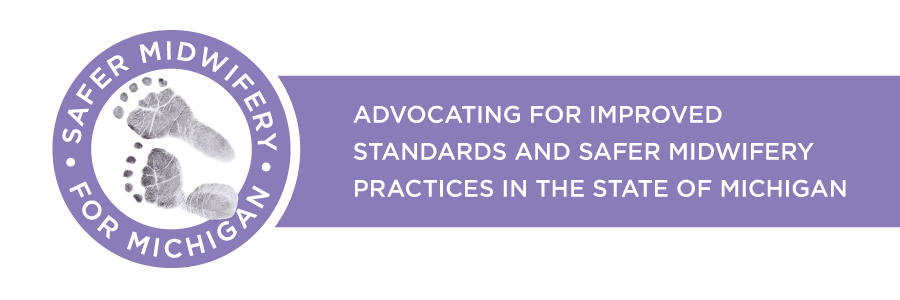Some may read our blog and draw the conclusion that we do not "like" or support Certified Professional Midwives." Please know that is not the intention. We do not aim to be inflammatory or derogatory toward CPMs.
For Safer Midwifery for Michigan, the bottom line is a clear, an appropriate standard for education and training is absolutely critical. Research from around the world points to a high level of education as one of the key factors in positive birth outcomes outside the hospital. You can visit recent posts about the Education of Midwives Around the World, Part I, and Part II to further understand this research, and how it highlights glaring disparities between educational standards for midwives in other countries as compared to the US. Notice in these links that other first world countries have much higher standards, most requiring a university level education for the women delivering their babies. What about the USA? The minimum standard for a CPM's education is only recently (2012), a high school diploma.
The problem with the CPM credential lies in credibility and severe inconsistencies among providers who carry the credential. While there may be some CPMs who are highly educated, there are far, far too many who are not, and they are all thrown in the pot together. Scope of practice is undefined at best, purposefully leaving it up to the midwife herself to determine along the way. For example, check out NARM's "Shared Decision Making Statement". The end result is a variable pool of midwives, some who are highly educated, and those that are not with a smattering of skills in between. Some are even rushing through the training with a careless preceptor so they can be "grandfathered in" when licensing legislation does pass. For a little history lesson about the CPM credential, and the importance of educational standards, visit our recent guest post by Judith Rooks, CNM.
The American College of Nurse Midwives said it well in a letter sent to members of Congress in 2009:
"Until the CPM community has developed a uniform process
to ensure that all
CPMs have graduated from an accredited program,
Congress should not recognize
this class of provider in its entirety."
We sincerely understand the desire and need for a credential that offers reliable care for the out-of hospital client, but in what world is an apprenticeship process acceptable for delivering babies? Especially when there are other routes to professional midwifery credentials that require a graduate level of education, like the CM credential, or the CNM. Or what about states that provide provisions and appropriate licensing for all three credentials like the state of New York?
Education Requirements for Licensure in NYS:
All midwives, regardless of credential or educational background must meet certain criteria to be eligible for licensure in NYS:
-- Bachelor's degree (doesn't matter what subject) -- which you already have.
-- Midwifery education at a NYS approved midwifery school*
-- Can demonstrate competency in particular areas relating to well-woman
care and pharmacology (see http://www.op.nysed.gov/midwif.htm check
under education)
All midwives must take and pass the AMCB certification exam which is
designed for CNMs or CMs, but which all midwives in NYS must take (the
NARM exam is not accepted here).
** Several MEAC schools have been deemed acceptable by NYS. CPMs using
the PEP process can become licensed, but they must then go to a
midwifery school and have a bachelor’s degree. Several CPMs have become
licensed in NYS by attending the distance learning program at the
National College of Midwifery and obtaining a BS in midwifery.
(These guidelines and standards for education are in line with ACOG and AAP's recent statements on planned home birth.)
Some are uncomfortable with any kind of comparison among credentials, CPM, CM, and CNM. I would ask them, how is a healthy conversation about the safety of midwifery, and educational standards possible without discussing the difference among them? Somehow that is misconstrued as breaking the sisterhood, or damaging the image of midwifery. I have to say, nothing is more damaging to midwifery than continued unsafe practices, preventable deaths, and injuries that are ignored, and the multitude of issues that continue to go unaddressed ~ even outright ignored.
Our advocacy group believes that women and families deserve transparency. They deserve to know, discuss, and understand the differences between these credentials, and how it impacts their care. Lines between these credentials have been purposefully blurred to the public, allowing dangerous midwives to practice under the same hat as those who practice responsibly. Need an example? MANA's "What is a Midwife?" leaves out all the important details about educational standards and the differences in scope of practice among various types of midwives. They make it seem as if their training is on par with the rest of the world, even citing an International definition of "midwife"...all while the minimum standards for CPMs don't even meet International educational standards. It's misleading, confusing, and leaves women feeling scammed when the unthinkable happens.
It's time for frank discussions about what our standards should be for education and practice of all midwives in this country and state, and the public deserves to have a say. It's not about leaving anyone out, insulting any one body of midwives, or being divisive. It's about establishing a minimum bar for education and standards for practice that are appropriate, with safety and outcomes at the forefront. It's about supporting midwives in reaching that bar if they aim to provide excellent care for mothers and babies in any environment, home or hospital. It's about taking the time to get a sound education and offer women choices they can rely upon. We've said all along, the state of midwifery cannot improve if it cannot accept and address its shortcomings.
Instead of getting offended, lets get the difficult conversations started, and move toward real progress.
